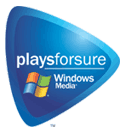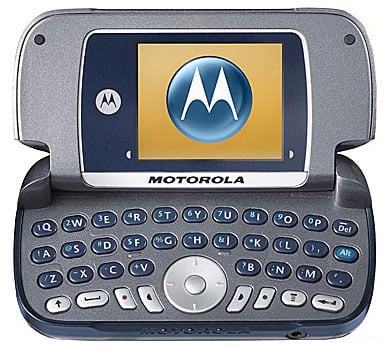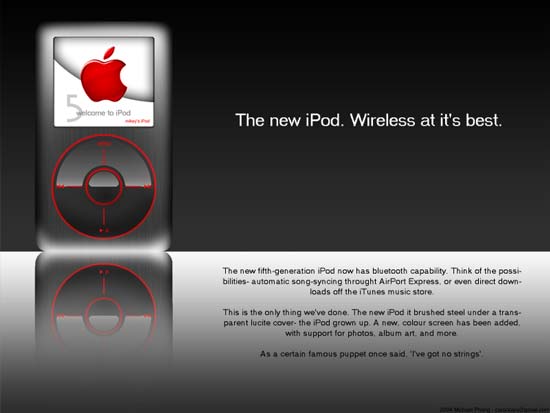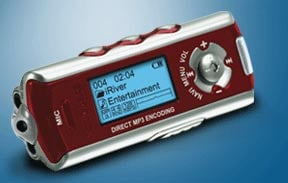Find Our Latest Video Reviews on YouTube!
If you want to stay on top of all of our video reviews of the latest tech, be sure to check out and subscribe to the Gear Live YouTube channel, hosted by Andru Edwards! It’s free!
Sunday December 5, 2004 5:46 am
The Future of Digital Music
 With the information age in full swing, digital music has become another part of American pop culture. The compact disc ushered in the beginning of digital music mass appeal, and recently the infamous MP3 has been at the forefront of the movement, as well as the controversy. There are also SACDs (Super Audio Compact Discs) and DVD-Audio discs to deal with now, as they offer surround sound along with a higher fidelity. Great for the audiophiles out there.
With the information age in full swing, digital music has become another part of American pop culture. The compact disc ushered in the beginning of digital music mass appeal, and recently the infamous MP3 has been at the forefront of the movement, as well as the controversy. There are also SACDs (Super Audio Compact Discs) and DVD-Audio discs to deal with now, as they offer surround sound along with a higher fidelity. Great for the audiophiles out there.For many, digital music has no "fixed" format. It is just various files ranging between 3-5 MB in an MP3, AAC, or WMA format filling their hard drives and populating various peer to peer networks on the internet. No matter what format you use, these fairly new compression methods make it easy to carry along your entire music collection with you wherever you go, surpassing anything we could have done a decade ago. So where are we headed? The Gear Live editors take a look at the future of digital music after the jump.
Andru: Obviously, Apple has done a tremendous job in the digital music arena. When one thinks of a digital music player, more often than not they think of the iPod. When you think of downloading music legally, iTunes is at the forefront. Introduced back on November 10, 2001, the iPod has become a part of what you may call a suite of ideas which are all integrated together. With the recently released iPod photo, you have the music which you sync in from iTunes, photos which sync through iTunes from iPhoto or a similar product on the PC, media portablility, and the ability to play slideshows directly from the device on a television screen - but this article is about the future, not the present.
Hector: I'm almost afraid to comment on what we'll see in the future because some of these ideas aren't copyrighted, and may show up on the next batch of digital players.
Andru: Of course, Apple will continue updating the iPod line. That's a given. What you may not know, though, is that back in July, Apple and Motorola announced their partnership which will bring iTunes to your Motorola cell phones. What is big about this is that this is the first portable hardware that will sync with iTunes allowing you to listen to music purchased through Apple's pnline music store on the go. Currently, the only way to listen to iTunes music is strictly on the iPod and its various iterations. I am not expecting huge storage on these phones either, otherwise they become indirect competition to the iPod. Instead, I think we will see the phones able to port about 50 tracks.

The iTunes/Motorola connection brings exciting possibilities for the future or portable audio convergence.
Greg: I saw some staggering numbers today about how subscription services (such as Rhapsody and Napster's subscription service) are outpacing pay per song services. I definitely think there is some future to a system that opens you up to new music (as broadcast radio USED to do), while still allowing you to choose from songs you like. I think the industry has many years of murkiness ahead with the RIAA still not understanding what the market wants, and to some extent, the market not really knowing what the market wants. I certainly didn't know five years ago that I wanted a hard drive based MP3 player, but with technology comes desires to push that technology even further.
Hector: With the players of the future, we will be able to schedule personal recordings of incoming broadcast music on a given hour, and play it back when we have the free time. It's a very similar concept to what's being done with DVR's, such as TiVo. Imagine listening to a certain program or DJ that played a couple nights ago, but at your own leisure. Even better, we would be able to save the recordings into a file for endless playback later. Right now you can record off of an incoming FM signal, but you have to be listening in at the time, and even then you're not sure if they're going to play the song that you want. I want to substantially fill out my music collection.
Greg: I definitely think Hector is correct here; TIVO for radio has already begun to emerge a little bit. A program was released about a year ago that recorded at your specified time, any Tunecast radio stream, some even stream at 128kbps and higher, CD quality. The program then cut the stream into separate mp3s and used the information from the radio server to fill in the ID3 tags. But with internet radio and podcasting continually gaining momentum as people sicken of the monotony of the same playlists on every broadcast radio station, the ability of every person interested to start their own radio station is intriguing.
Andru: What about the future of the iPod itself? Gear Live readers recently told us what they thought might be in store for the device, but if we think like Apple, what can we expect? Well, the company is all about being chic. I wouldn't be surprised to see an iPod with Bluetooth or WiFi integrated which would then allow you to broadcast music from the iPod straight to your home entertainment system. You may also be able to wirelessly sync to iTunes, or better yet, make a purchase straight through the iPod itself. Throw in a set of Bluetooth earbuds, and you have the first completely wireless iPod.
Obviously, Apple isn't the only one with a successful MP3 player brand. Other companies like iRiver, Creative, Rio Audio, JetAudio, and Sony also have successful digital audio players. Creative recently waged war on Apple, as they are looking to lead the pack.

Many speculate on what the future iPod will end up looking like, adding more than just visual upgrades.
Greg: I think Apple is obviously going to face some competitors in the MP3 player space, they already have some, but so far they have seemed to lack the asthetic beauty of the iPod, as well as the usability. I have heard some really great things about the new Zen, with a lot of reviews calling it more intuitive than the iPod. Rio has been there since the beginning of MP3 players, and has a great offering in the Karma, which boasts an Ethernet port, a great addition if that is something that interests you. But as with desktop computers, I think Apple will always have a certain market share just simply by being better in terms of product engineering, albeit with a higher price point. As hard drives get smaller, cheaper and larger in terms of capacity, obviously the race becomes getting the most features, into the smallest package with the cheapest price tag. I think Apple definitely will have some competition there, but can ultimately survive by coming up with the coolest devices that keep blowing people away, no small task.
Hector: I'm tired of having to burn CD's if I want to play my files on my car stereo. Future systems will include wireless file transfer, so that you can seamlessly access songs from your player while in your car. Yes, the Griffin iTrip accessory sends the songs over an FM frequency to your car, but it has trouble in certain urban environments, and you have to fish for an available frequency. What I mean is something akin to a wireless LAN. Your digital music player, your PC, and your car stereo will all access and play your songs in a shared network. Better yet, we should be able to share songs from one person's player to another. How cool is that? You see someone with the infamous white headphone cords, you know that he or she can beam you a song from their collection with a couple clicks. IR port beaming has been around for ages. Why hasn't someone thought of this yet?
Andru: One thing I do expect in the future, is to see flash MP3 players slowly diminish from the market. While it is more shock absorbent, I just don't see the cost of the medium as being feasible going forward, especially with hard drive prices plummetting.
The other thing we have to consider is storage capacity. It boggles my mind when companies release 128 MB or 256 MB MP3 players nowadays. It won't be long before 1 GB is the lowest anyone will want to go. With convergence coming into play, people are wanting to start putting pictures and video on their portable devices as well. I say bring it on. It's not far off that we will be able to buy 100 GB portable video players. Heck, the iPod is already up to 60 GB while still being palm-sized. Of course, video would benefit from a larger screen. Just look at the DVX-POD to see why.

The DVX-POD brings all of your media together into one device with a high resolution screen to boot.
Hector: Today there are already headphones that can pick up the poor quality MP3's encoded at 128 kbps. We're limited in terms of bitrate for now, but wouldn't it be nice to have hundreds of SACD-quality music files in the palm of our hand? How about even beyond that? Imagine when players improve by leaps and bounds to provide pristine highs and thunderous bass, in a positional audio format? From one set of phones you'll be able to hear lightning crackle above you and winds enveloping you in a soundtrack score. We want to lose ourselves in the music during those long commutes, and digital players will eventually take us there.
Much of that relies on better sound cancellation technology. I have a brutal, clashing subway ride to work every morning, and current earbuds still aren't good enough to completely shut it all out. You can try turning up the volume, but you wonder what kind of damage that's going to do on your ears. Future technology will give us complete silence when we need it, no matter how loud the environment.
All players need to have embedded lyrics-display technology. Karaoke jukeboxes have had this for years. There's no excuse for not making the most of our digital medium. There are already fields of information connected to each of our files. How difficult is it to include a field for the lyrics. iRiver has this function now in at least one of it's current models, but it's tedious, requiring the user to indicate the time measures so that the words on display coincide to where you are in the music. If I had just a screen with a controllable jog wheel to scroll down the lyrics for myself, that would at least be a start.
Convergence is going to play a bigger and bigger role for audio players as we look to the future. It's not enough just to be a music player anymore. These days you need to also be portable storage, a PDA, a cellphone, a watch, and a video player on top of that. Considering how much the world loves music, it's not too surprising that audio players are as ubiquitous as they are. I know I listen to music when I do my chores. Won't be long before they embed one into my mop.

iRiver takes a multi-tiered approach, having both hard drive and flash based music players in varying sizes.
Andru: The thing that I see as being the biggest issue going forward is DRM (digital rights management). iTunes has their DRM for their AAC files, while Microsoft has another for WMA. Of course, they are trying to make it easy with their PlaysForSure initiative. Sony has yet another for it's ATRAC files, and MP3 has none. Therefore, an iPod cannot play any WMA files, and nothing but an iPod can play Apple AAC files. Music purchased from Sony Connect can only be played on Sony digital audio players. Why all the confusion? Fine, we understand that the RIAA wants to protect its property, but do they have to do it at the expense of causing mass confusion amongst casual music buyers? Even better, why can't these protected files just work across platforms? If you look at DVD's, there is one protection standard. We should have the same thing for our digital music. If there was an effective DRM solution out there, it would seem that the music stores would have no choice but to support it as it would ease the minds of the purchasers, thus bringing in more cash.
Hector: The best news of all is that players are becoming cheaper and cheaper. Apple isn't alone in this market anymore; actually it never was. And with increased competition, things are always getting cheaper, while at the same time becoming smaller, and faster.
Greg: I think the amazing thing about digital audio is the ability of it to free our music. Just think about it, to not be tethered to your home stereo and your cd collection, just grab your mp3 player and go. It's an amazing thing to have portability across listening mediums. For example, docking an iPod on your home stereo, then grabbing the iPod for your walk down the street. Climb in your car and plug in the iPod, and drive for days and still not run out of music, all out of one device. The freedom of a garage band, to record their tracks on a laptop, mix the audio and produce their album. Upload the tracks to a download service and sell their music, send out demos, all without costly studio time. Or someone who is sick of the same pop tracks on the radio, putting together a playlist and starting and internet radio station, to share his music with lovers of the same music. Digital audio is doing for music what the printing press did for books, it makes the medium available for all, not just those with the means to enjoy it, or create it. Digital audio has led to an era of freedom for our music.
Latest Gear Live Videos
Advertisement
Advertisement
Advertisement
© Gear Live Inc. {year} – User-posted content, unless source is quoted, is licensed under a Creative Commons Public Domain License. Gear Live graphics, logos, designs, page headers, button icons, videos, articles, blogs, forums, scripts and other service names are the trademarks of Gear Live Inc.











